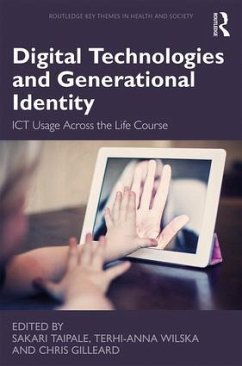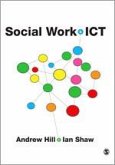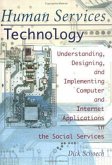Digital Technologies and Generational Identity
ICT Usage Across the Life Course
Herausgeber: Taipale, Sakari; Gilleard, Chris; Wilska, Terhi-Anna
Digital Technologies and Generational Identity
ICT Usage Across the Life Course
Herausgeber: Taipale, Sakari; Gilleard, Chris; Wilska, Terhi-Anna
- Gebundenes Buch
- Merkliste
- Auf die Merkliste
- Bewerten Bewerten
- Teilen
- Produkt teilen
- Produkterinnerung
- Produkterinnerung
Combining a collection of international perspectives from a range of fields, including social gerontology, social policy, sociology, psychology, anthropology, gender studies, communication and marketing, this book weaves empirical evidence with theoretical insights on the role of digital technologies across the life course.
Andere Kunden interessierten sich auch für
![Critical Ict4d (Information and Communication Technologies for Development) Critical Ict4d (Information and Communication Technologies for Development)]() Critical Ict4d (Information and Communication Technologies for Development)197,99 €
Critical Ict4d (Information and Communication Technologies for Development)197,99 €![Human Growth and Development Human Growth and Development]() John SudberyHuman Growth and Development197,99 €
John SudberyHuman Growth and Development197,99 €![Human Behavior in the Social Environment Human Behavior in the Social Environment]() Anissa RogersHuman Behavior in the Social Environment305,99 €
Anissa RogersHuman Behavior in the Social Environment305,99 €![Social Work and Health Care Practice with Transgender and Nonbinary Individuals and Communities Social Work and Health Care Practice with Transgender and Nonbinary Individuals and Communities]() Social Work and Health Care Practice with Transgender and Nonbinary Individuals and Communities197,99 €
Social Work and Health Care Practice with Transgender and Nonbinary Individuals and Communities197,99 €![African Women in the Fourth Industrial Revolution African Women in the Fourth Industrial Revolution]() African Women in the Fourth Industrial Revolution200,99 €
African Women in the Fourth Industrial Revolution200,99 €![Social Work and ICT Social Work and ICT]() Andrew HillSocial Work and ICT165,99 €
Andrew HillSocial Work and ICT165,99 €![Human Services Technology Human Services Technology]() Simon SlavinHuman Services Technology115,99 €
Simon SlavinHuman Services Technology115,99 €-
-
-
Combining a collection of international perspectives from a range of fields, including social gerontology, social policy, sociology, psychology, anthropology, gender studies, communication and marketing, this book weaves empirical evidence with theoretical insights on the role of digital technologies across the life course.
Hinweis: Dieser Artikel kann nur an eine deutsche Lieferadresse ausgeliefert werden.
Hinweis: Dieser Artikel kann nur an eine deutsche Lieferadresse ausgeliefert werden.
Produktdetails
- Produktdetails
- Verlag: Taylor & Francis
- Seitenzahl: 230
- Erscheinungstermin: 2. August 2017
- Englisch
- Abmessung: 234mm x 156mm x 16mm
- Gewicht: 522g
- ISBN-13: 9781138225978
- ISBN-10: 1138225975
- Artikelnr.: 48914132
- Herstellerkennzeichnung
- Libri GmbH
- Europaallee 1
- 36244 Bad Hersfeld
- gpsr@libri.de
- Verlag: Taylor & Francis
- Seitenzahl: 230
- Erscheinungstermin: 2. August 2017
- Englisch
- Abmessung: 234mm x 156mm x 16mm
- Gewicht: 522g
- ISBN-13: 9781138225978
- ISBN-10: 1138225975
- Artikelnr.: 48914132
- Herstellerkennzeichnung
- Libri GmbH
- Europaallee 1
- 36244 Bad Hersfeld
- gpsr@libri.de
Sakari Taipale works as an Academy of Finland Research Fellow at the University of Jyväskylä, Finland. He is also an Adjunct Professor at the University of Eastern Finland. Terhi-Anna Wilska is a Professor of Sociology at the Department of Social Sciences and Philosophy, University of Jyväskylä, Finland. Chris Gilleard is a Visiting Research Fellow at the Division of Psychiatry, University College London and a Visiting Senior Research Fellow at the Department of Social and Policy Sciences, University of Bath, UK.
Chapter 1. Introduction (Sakari Taipale, Terhi-Anna Wilska and Chris Gilleard) Section I: Historical, theoretical, and methodological perspectives Chapter 2. The place of age in the digital revolution (Chris Gilleard) Chapter 3. Generational analysis as a methodological approach to study mediatised social change (Göran Bolin) Chapter 4. Generational analysis of people's experience of ICTs (Leslie Haddon) Section II: Family generations and ICT Chapter 5. Mobile life of middle-aged employees: fragmented time and softer schedules (Mia Tammelin and Timo Anttila) Chapter 6. Intergenerational solidarity and ICT usage: empirical insights from Finnish and Slovenian families (Sakari Taipale, Andra Petrov
i
and Vesna Dolni
ar) Chapter 7. Gendering the mobile phone: a life course approach (Carla Ganito) Chapter 8. How young people experience elderly people's use of digital technologies in everyday life (Leopoldina Fortunati) Chapter 9. ICTs and client trust in the care of old people in Finland ( Helena Hirvonen) Chapter 10. Mobile phone use and social generations in rural India (Sirpa Tenhunen) Section III Consumption, lifestyles and markets Chapter 11. Necessities to all? The role of ICTs in the everyday life of the middle-aged and elderly between 1999 and 2014 (Terhi-Anna Wilska and Sanna-Mari Kuoppamäki) Chapter 12. A risk to privacy or a need for security? Digital domestic technologies in the lives of young adults and late middle-agers ( Sanna-Mari Kuoppamäki, Outi Uusitalo and Tiina Kemppainen) Chapter 13. Personality traits and computer use in midlife: leisure activities and work characteristics as mediators (Tiia Kekäläinen and Katja Kokko) Chapter 14. Electronic emotions, age and the life course (Jane Vincent) Chapter 15. Conclusions (Chris Gilleard, Terhi-Anna Wilska and Sakari Taipale)
i
and Vesna Dolni
ar) Chapter 7. Gendering the mobile phone: a life course approach (Carla Ganito) Chapter 8. How young people experience elderly people's use of digital technologies in everyday life (Leopoldina Fortunati) Chapter 9. ICTs and client trust in the care of old people in Finland ( Helena Hirvonen) Chapter 10. Mobile phone use and social generations in rural India (Sirpa Tenhunen) Section III Consumption, lifestyles and markets Chapter 11. Necessities to all? The role of ICTs in the everyday life of the middle-aged and elderly between 1999 and 2014 (Terhi-Anna Wilska and Sanna-Mari Kuoppamäki) Chapter 12. A risk to privacy or a need for security? Digital domestic technologies in the lives of young adults and late middle-agers ( Sanna-Mari Kuoppamäki, Outi Uusitalo and Tiina Kemppainen) Chapter 13. Personality traits and computer use in midlife: leisure activities and work characteristics as mediators (Tiia Kekäläinen and Katja Kokko) Chapter 14. Electronic emotions, age and the life course (Jane Vincent) Chapter 15. Conclusions (Chris Gilleard, Terhi-Anna Wilska and Sakari Taipale)
Chapter 1. Introduction (Sakari Taipale, Terhi-Anna Wilska and Chris Gilleard) Section I: Historical, theoretical, and methodological perspectives Chapter 2. The place of age in the digital revolution (Chris Gilleard) Chapter 3. Generational analysis as a methodological approach to study mediatised social change (Göran Bolin) Chapter 4. Generational analysis of people's experience of ICTs (Leslie Haddon) Section II: Family generations and ICT Chapter 5. Mobile life of middle-aged employees: fragmented time and softer schedules (Mia Tammelin and Timo Anttila) Chapter 6. Intergenerational solidarity and ICT usage: empirical insights from Finnish and Slovenian families (Sakari Taipale, Andra Petrov
i
and Vesna Dolni
ar) Chapter 7. Gendering the mobile phone: a life course approach (Carla Ganito) Chapter 8. How young people experience elderly people's use of digital technologies in everyday life (Leopoldina Fortunati) Chapter 9. ICTs and client trust in the care of old people in Finland ( Helena Hirvonen) Chapter 10. Mobile phone use and social generations in rural India (Sirpa Tenhunen) Section III Consumption, lifestyles and markets Chapter 11. Necessities to all? The role of ICTs in the everyday life of the middle-aged and elderly between 1999 and 2014 (Terhi-Anna Wilska and Sanna-Mari Kuoppamäki) Chapter 12. A risk to privacy or a need for security? Digital domestic technologies in the lives of young adults and late middle-agers ( Sanna-Mari Kuoppamäki, Outi Uusitalo and Tiina Kemppainen) Chapter 13. Personality traits and computer use in midlife: leisure activities and work characteristics as mediators (Tiia Kekäläinen and Katja Kokko) Chapter 14. Electronic emotions, age and the life course (Jane Vincent) Chapter 15. Conclusions (Chris Gilleard, Terhi-Anna Wilska and Sakari Taipale)
i
and Vesna Dolni
ar) Chapter 7. Gendering the mobile phone: a life course approach (Carla Ganito) Chapter 8. How young people experience elderly people's use of digital technologies in everyday life (Leopoldina Fortunati) Chapter 9. ICTs and client trust in the care of old people in Finland ( Helena Hirvonen) Chapter 10. Mobile phone use and social generations in rural India (Sirpa Tenhunen) Section III Consumption, lifestyles and markets Chapter 11. Necessities to all? The role of ICTs in the everyday life of the middle-aged and elderly between 1999 and 2014 (Terhi-Anna Wilska and Sanna-Mari Kuoppamäki) Chapter 12. A risk to privacy or a need for security? Digital domestic technologies in the lives of young adults and late middle-agers ( Sanna-Mari Kuoppamäki, Outi Uusitalo and Tiina Kemppainen) Chapter 13. Personality traits and computer use in midlife: leisure activities and work characteristics as mediators (Tiia Kekäläinen and Katja Kokko) Chapter 14. Electronic emotions, age and the life course (Jane Vincent) Chapter 15. Conclusions (Chris Gilleard, Terhi-Anna Wilska and Sakari Taipale)








